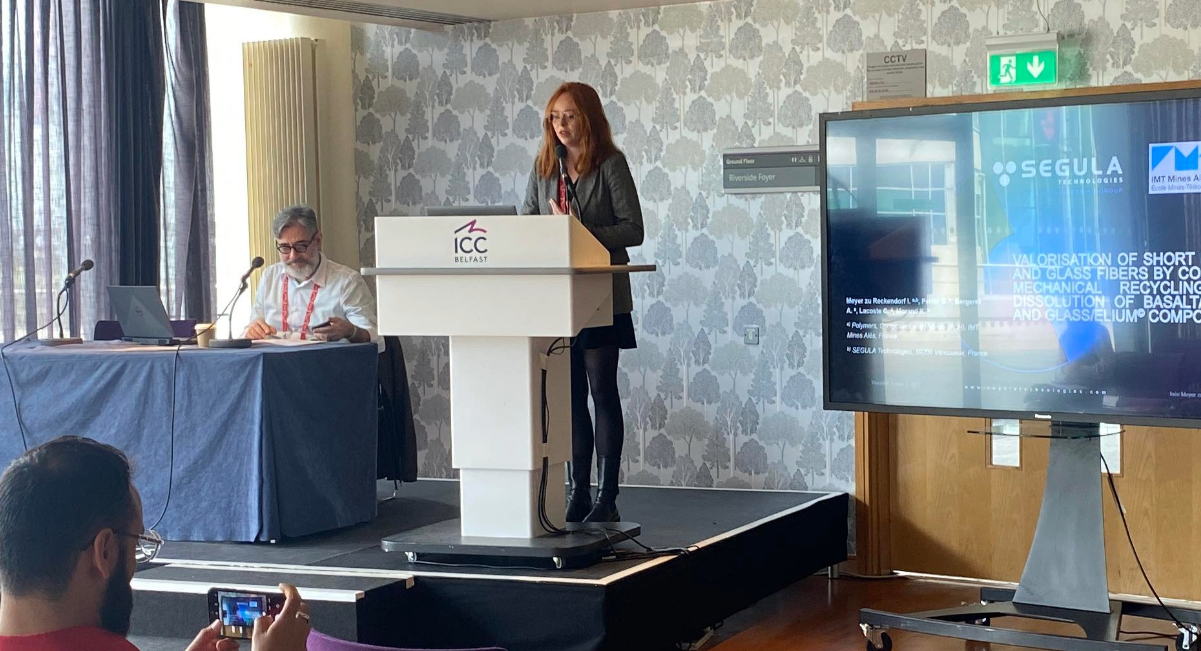My student experience: Inès M., PhD student in materials chemistry

How did you get into SEGULA Technologies?
I joined SEGULA for my final year work placement, which I did with the Research & Innovation (R&I) team in Lyon, in partnership with the Centre des Matériaux des Mines d’Alès (C2MA). I then continued my internship work on a fixed-term contract, before embarking on a CIFRE thesis supervised by SEGULA and C2MA.
Why did you choose to do your work placement at SEGULA?
I found out about the project and SEGULA through an internship offer. I wanted to do a placement in industry and in the recycling of polymer materials. The placement was a great opportunity to combine the two elements.
Can you tell us a bit about your placement?
My placement involved the chemical recycling of thermoplastic matrix composites. The theme of the course was to recycle by dissolution the materials being worked on by a SEGULA PhD student, who defended her thesis at the end of last year.
And at the end of the placement, what motivated you to continue at SEGULA?
The placement enabled me to confirm that I really liked the ‘research’ side of things, and it made me want to go on to do a PhD, even though that wasn’t my objective at the start of the placement. I liked the working atmosphere in the lab and, even though I wasn’t working directly in an agency, I also liked the way SEGULA worked. There was good communication between the different members of the team. I liked that, I felt integrated despite the distance. I took part in the same meetings as the trainees at the agency.
What are your current assignments?
Many applications currently use foams, but they are petroleum-based products. My thesis involves developing alternative foams: the idea is to be able to formulate foams of natural origin that are more environmentally friendly. I’m working with tannins, which are of plant origin and represent an interesting avenue.
There are several industrial applications for these foams, thanks to their excellent thermal insulation properties, particularly in the automotive sector. Work is also planned at a later date on the end-of-life of these foams and their recovery.
And which part do you enjoy the most?
The sharing of science and knowledge and the associated communication. It’s a slightly idealised vision of research, but it’s still what motivates me.
I had already written an article at the end of my placement in collaboration with the doctoral student who was supervising me. At the beginning of August, I was able to take part in the International Conference on Composite Materials (ICCM 23) in Belfast. I presented my work on recycling composites and met a manufacturer who was very interested in my work. Ultimately, it would be very rewarding to collaborate on a very specific application, to move on to a larger scale and go beyond the laboratory stage.
What surprised you most about your job?
The subject of scientific communication! I realised that in this sector, some people are very keen to share their knowledge, while others are more closed-minded about the details of their project. Maybe I was expecting everything to be a bit too ideal!
Has your view of the world of engineering and research changed since your training?
With the projects carried out at school on academic subjects, we were certainly already somewhat aware of research, but I was surprised when I arrived in the laboratory to see how well organised the work was.
As far as engineering is concerned, I had already done a work placement in a company at the end of my first year at engineering school. I was pleasantly surprised by the pace of the work.
Originally I wanted to stop my studies after engineering school, but I find that my work is more effective when I do a thesis. The fact that I’m contributing to a project that’s close to my heart is also very rewarding.
How would you describe the gender balance in your sector?
In chemistry, we’re closer to parity than in other industrial sectors. It depends on the specialities, but compared with the rest of the engineering world, it’s definitely more feminine!
The school didn’t impose any particular orientation for women or men, so everyone can choose what they want to do. As for me, I chose the chemistry school because I thought it was important to be in an environment where there was more parity.
But at the last international conference, I saw that the world of composites was much more male-dominated. That was a shock, because I hadn’t been confronted with this kind of distribution since science prep school.
What do you see as the next step in your career after your thesis?
I don’t know yet! The academic environment is conducive to taking part in a lot of projects, and there’s also the teaching part, although for the moment I’m not sure that’s my thing.
At the same time, I like the square, rigorous aspect of the company… having very precise deadlines! Everything is well organised and that’s what I like about the industry.
And then maybe some management? At the moment I’m just starting out in management and I like it. I’d like to take it to the next level and have my own work strategy.
What advice would you give to future trainees and engineers?
I’d say give Research & Innovation a try. It allows us to understand both how projects work and the technical background to the work.
Most of my fellow engineering students have found jobs in quality or production, except that once you’re in these areas, it’s hard to go back to R&I!
However, there was nothing to stop me from applying for other types of engineering jobs if I didn’t like R&I. I said to myself “give it a go and see where it takes you” and that really helped me choose what I was going to do next!


